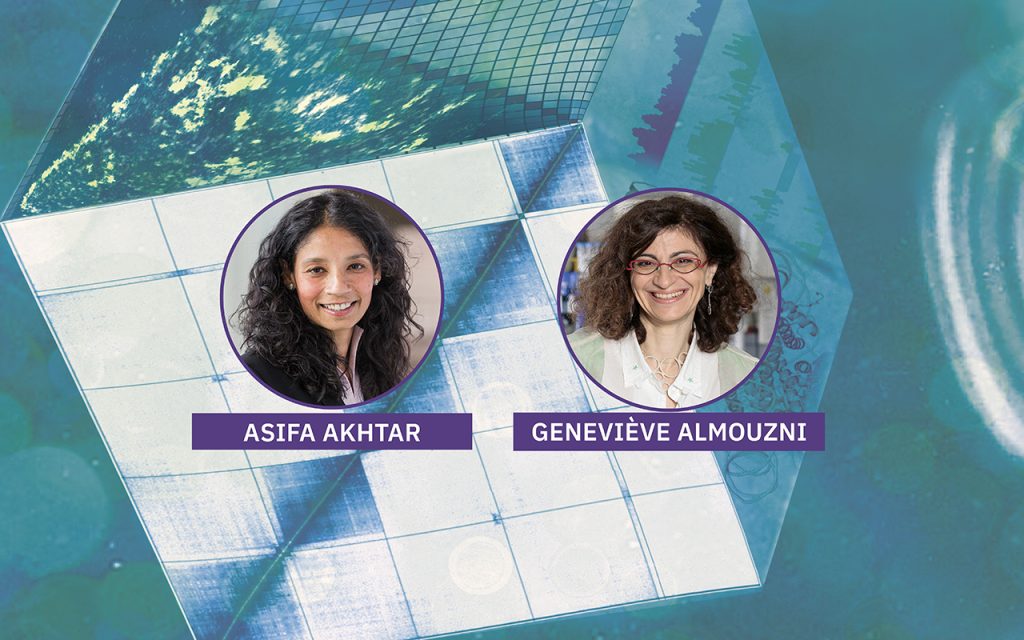Celebrating 10 years of Chromatin and Epigenetics
Our upcoming EMBL Conference: Chromatin and Epigenetics is celebrating its 10th anniversary this year! Although this year’s conference will be very different in format (yup, you guessed right: virtual!), the topics to be discussed will be as exciting as always.
We spoke to Asifa Akhtar and Geneviève Almouzni, the scientific organisers who have been there since the beginning of this conference series. Read on to find out what inspired them to organise this event in the first place, and what highlights can be expected at the virtual conference!

The Chromatin and Epigenetics conference is celebrating its 10th anniversary this year. How did it all start and how has it developed over the years?
GA: I was part of the original organisation committee when it started — 20 years ago already! A long journey already… The meeting actually started with the wish to give credit to my Postdoc mentor Dr. Alan Wolffe who had tragically passed away and was very active in the field. He was coined the “champion of Epigenetics” back then… You can see his picture in the corner of the conference image.
When I started my lab, he used to tease me about having a conference in Europe on a field that was just starting to take off. The fact is that since then it has become a major gathering of people in the field, including those actively engaged in the EC funded Network of Excellence — first the Epigenome and EpiGeneSys networks which expanded towards a broader community, including the LifeTime initiative and many friends from the 4DNucleome! Undoubtedly, research over the past two decades has been incredibly active, leading to the deciphering of chromatin-based mechanisms, multi-scale genome organisation and the uncovering of the role of epigenetics in various human disorders with an increasing interest in studying the influence of age, environment, life style and disease states. I am really excited to hear about the latest news…
AA: I was part of the original organisation team, and being located at EMBL meant that I have been part of all the nitty gritty deals of organising this conference ever since. We have had a series of outstanding co-organisers on board, which also developed the breadth of the meeting over the last 20 years. We have kept up with the pace of the field, and this meeting is a major biennial scientific event in the chromatin and epigenetics field. The location at EMBL has been fantastic, with all the support and infrastructure available to run a big meeting like this. It continues to be a pleasure to organise this conference, and I am excited about all the possibilities that the virtual format will bring.
What inspired you to organise this conference?
GA: This meeting is dear to my heart, and it has surely brought together a wonderful community in Europe that is well linked with people worldwide. Also, from the inception we wanted to engage younger people in the organisation and serve the community. It has a unique spirit — it is collegial and friendly, and a place where new collaborations arise — and a growing network! The fact is that people always presented their most advanced work and unpublished data, thereby offering opportunities to discuss science in the making. We hope that the virtual conference version this year will retain this special touch.
AA: Alan Wolffe was a great chromatin biologist and his sudden passing took many of us by surprise, and left great sadness. He was a wonderful mentor and was interested in young scientists, a quality which I had always admired. Co-incidentally my husband was a postdoc in Alan’s lab, just like Genevieve. In fact, Alan’s plan was to visit him during his trip that eventually led to the tragedy. Co-organising the memorial workshop in his memory was an honour and in the long run a tremendously important decision, as this meeting became a focal point for chromatin biologists and epigeneticists to meet in Europe and share the wonders of the latest science we are all doing. The chromatin and epigenetics conference originated from initial event and has grown stronger over the years.
Could you share what the focus and highlights of this year´s conference will be?
AA: The 10th conference in a series of meetings is a really memorable event and celebrating this during a global pandemic is a major challenge. We strive for excellence and this meeting will deliver many highlights and thrilling science. I very much hope that it will bring us together to appreciate the importance and perseverance of basic science, and that we celebrate coming together even in a virtual setting and show that we are dynamic and flexible, come what may…
GA: This year the session topics cover: Heterochromatin and HP1, developmental epigenetics, chromatin regulation, nucleosomes structure and function, transcription and chromatin defects and diseases, nuclear architecture as well as chromatin and RNA modifications. This is a very exciting program with both live-streamed invited speakers and selected short talks with Q&As, as well as digital poster sessions. We will also hold meet the speakers session along with some other surprises…
Among our speakers, Caroline Dean will tell us about cold-induced epigenetic switching in plants, Karen Adelman will discuss regulation of transcription elongation in development and diseases, Luciano di Croce the advances in the distinct role of Polycomb in stem biology and cancer, Bob Kingston on chromatin compaction and phase separation in epigenetic control of development, Danny Reinberg about Polycomb, inheritance and disease, Anja Groth will speak about chromatin replication and epigenome maintenance, Peter Becker will talk about how cooperation, competition and combination contribute to the targeting of the X chromosome and its regulation, Giacomo Cavalli and Allistair Boettiger about the 3D genome folding, Rick Young on Nuclear condensates, Tom Muir on chemical approaches and a Keynote by Wolf Reik on ways to exploit multiple single cell omics to unravel early embryo development.
Interested in this conference? Register by 19 April.